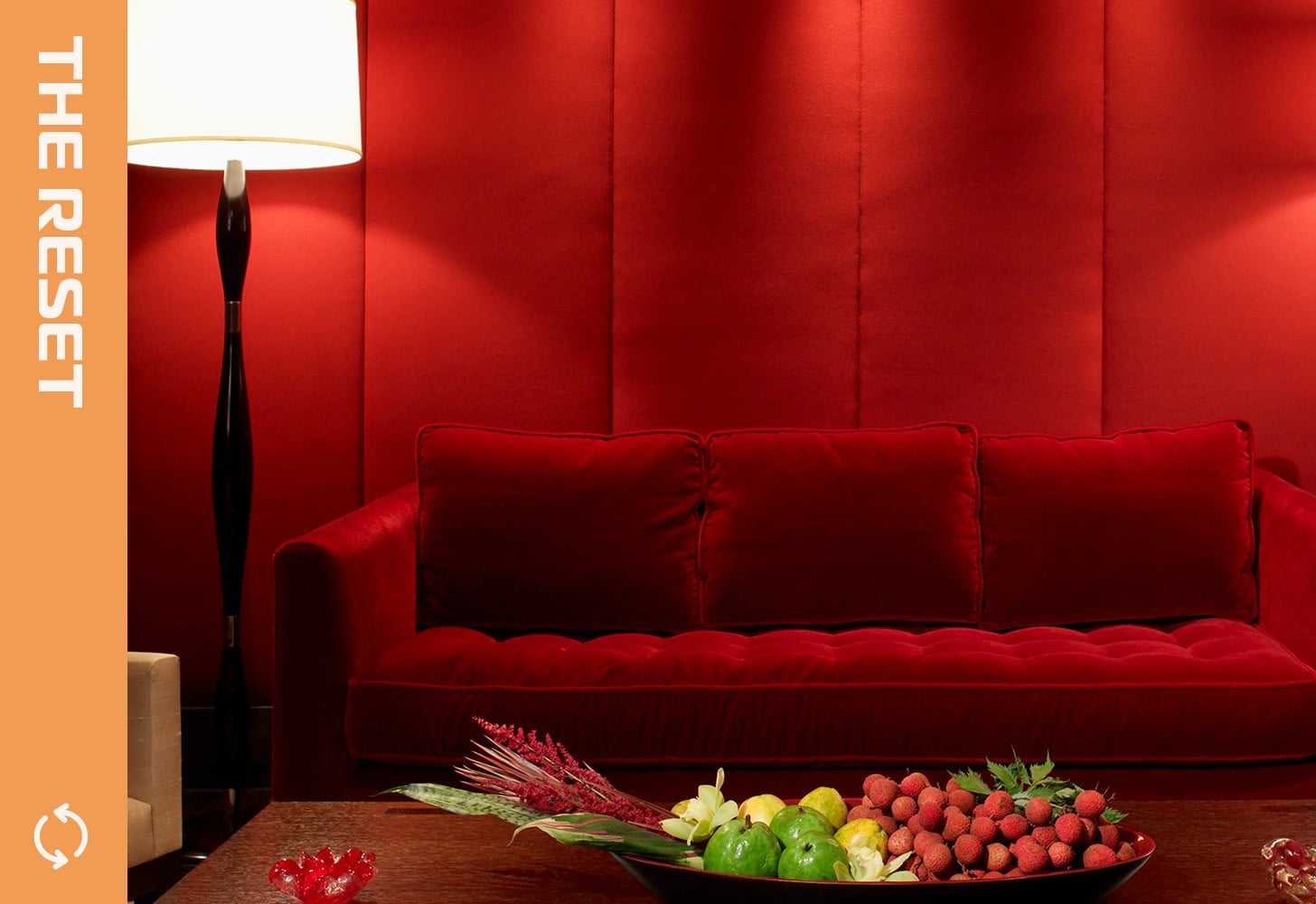How to Implement the "Unexpected Red" Theory Into Home Decor
How to Incorporate TikTok's "Unexpected Red" Theory Into Your Home

There's a new interior design trend circulating on TikTok, and you probably didn't see it coming. Enter: the "unexpected red" theory.
Introduced by creator Taylor Simon (@intayriors) in a viral TikTok video, the unexpected-red theory is the idea of "adding anything that's red, big or small, to a room where it doesn't match at all, and it automatically looks better." Whether it's vibrant red pedestal sinks in a moody blue-green bathroom or a red suede headboard against a purple accent wall, Simon suggests that the colour is a foolproof addition to any palette. She even makes the case for red as a neutral.
At first, that concept might seem surprising. Red doesn't seem like the best colour to refresh your bedroom with, and typically, neutrals skew more muted and subtle — light shades of white, cream, and grey, or dark variations of black, brown, and charcoal. In other words, they're universal colours that pair with anything. But with that logic, the unexpected-red theory might be onto something. If red really looks good in every room, in any scenario, why shouldn't we call it a neutral, too?
We asked a pro to weigh in. Ahead, New York City-based interior designer Emma Beryl helps break down the unexpected-red theory and shares additional decorating tips on how to incorporate red at home.
What Is the Unexpected-Red Theory?
The unexpected-red theory is the idea that an added pop of red — in a piece of furniture, like a sofa, or a smaller accent, like a table lamp — will make any space look better. But where these red accents really shine? In areas where they supposedly don't belong or shouldn't look good based on the colour of the room or the items they're near.
Beryl doesn't necessarily think this makes red a neutral colour, like the theory also nods to. Instead, she believes that the colour is simply vibrant enough to stand out and capture your attention, no matter the context. "[Red] goes well with almost everything, but don't be fooled," she tells POPSUGAR. "It goes well, but it is striking and usually the star of the show when added as a surprise element like the unexpected-red theory suggests."
If you're still stumped on how or why the unexpected-red theory works, it's important to consider tones and the colour wheel. "I feel like there is no other colour like red on the colour wheel, so adding it to any space really draws your attention to that object," Beryl says. "It is both warm and cool at the same time. It goes well with cooler colours like blues and greens, as well as warmer colours like oranges and yellows." Although red may never officially be called a neutral, it has similar qualities that make it both versatile and unique.
How to Implement the Unexpected-Red Theory Into Your Own Space
There are no hard and fast rules for decorating your own space, but if you'd like some tips for trying the unexpected-red theory at home, Beryl has a few suggestions.
Start small. "Incorporating any colour you aren't 100 percent sure about is easiest done through decor since it is smaller. Adding a pop of red through a vase or a lamp shade can be an eye-catching moment," she says. And if you want to go bigger? Try a larger piece of furniture, like a lounge chair or daybed. "The unexpected-red theory is pointing toward one item being red in the space, so choose something in your comfort zone."
Consider your colour palette. Although red can pair with anything, Beryl is especially fond of using it with all neutrals: "Red becomes the focal point and excites the eye even more," she says. She also likes using it in streamlined colour palettes. "I like seeing [red] in a room that is very tailored with a strong colour palette of two or three colours, like a room with blue and green and patterns, or yellow and orange, so the pop of red really stands out."
Try something other than red. Not into red? The theory can work similarly with other colours, like pink and green. "Pink being close to red makes sense since it pulls similar emotions, but green reminds people of nature, so adding a pop of green can calm the mind," Beryl says.
If you find yourself falling in love with the little pop of red in your space, don't be afraid to add the unexpected-red theory to other facets of your life too. For example, you can pair a neutral outfit with a pop of red lipstick or red heels with an otherwise all-black 'fit. Chances are, you'll quickly realise why red just may be the most superior colour of them all.
Carrie Carrollo is a POPSUGAR contributor and was formerly the brand's associate branded content beauty editor.



